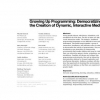194 search results - page 20 / 39 » Generation as method for explorative learning in computer sc... |
ICML
2004
IEEE
14 years 8 months ago
2004
IEEE
lative Novelty to Identify Useful Temporal Abstractions in Reinforcement Learning ?Ozg?ur S?im?sek ozgur@cs.umass.edu Andrew G. Barto barto@cs.umass.edu Department of Computer Scie...
CHI
2009
ACM
14 years 2 months ago
2009
ACM
Young people interact with games, animations, and simulations all of the time. But few of them are able to create interactive media. The obstacle: traditional programming language...
SIGCSE
1993
ACM
13 years 11 months ago
1993
ACM
Programming contests can provide a high-profile method for attracting interest in computer science. We describe our philosophy as it pertains to the purpose and merits of program...
MM
2005
ACM
14 years 1 months ago
2005
ACM
We propose a multi-sensor affect recognition system and evaluate it on the challenging task of classifying interest (or disinterest) in children trying to solve an educational pu...
UKCBR
1995
13 years 11 months ago
1995
Various cognitive and computational models have addressed the use of previous experience to understand a new domain. In particular, research in case-based reasoning has explored t...

